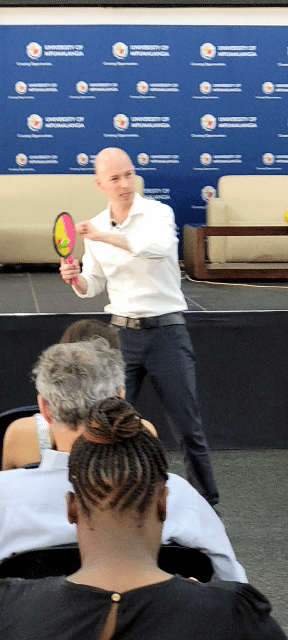‘I want to, but my university won’t let me’
Following my keynote at the three-day conference in South Africa, the audience is wildly enthusiastic. ‘I would love to present my research in this way,’ several African researchers respond. They come from countries such as Ethiopia, Kenya and Nigeria. ‘But at my university we are expected to follow a strict set of rules.’
The 100 participants are researchers, professors, farmers, and experts who transfer their knowledge to farmers. Their common theme: roundworms or nematodes. Those worms not only cause damage to potatoes, but also tomatoes and coffee. The organisers had invited me with one clear goal: make science communication the common thread of the conference.

Never before had I presented this many sessions over the course of three days: a keynote, coaching of researchers who would speak in plenary, try-out sessions, individual feedback. I was also a judge and host of the plenary presentation session. ‘Hans, you really opened my eyes!’, I heard over and over again.
But right alongside seeing enlightenment, I saw these researchers overcome by doubt. Will I be taken serious if I present in this manner? Will I come across as professional enough? What if my supervisor isn’t on board with this, at all?

Keep scrolling to read my answers.
It’s customary, but not a rule set in stone
‘It’s not allowed.’ Says who? Where does it state that you must start with a title slide, or that you must always chant the same song ‘Hello, I am (name), researcher at (university), and my research is about (topic) …’? Sure, it’s a tradition, but one that causes your audience to pay very little attention to what you’re saying.
Don’t focus on that one negative comment, but rather on all the positive reactions
Several participants mentioned that in the past they had occasionally received negative feedback when they had tried out something new, such as ‘You are too confident’. That criticism had hung over them like a thundercloud and made them quite insecure.
Instead, don’t focus on that one comment. Chances are you received many more positive responses. Some individuals simply have a hard time coping with change.
Change comes from showing that it works
Wouldn’t it be terrific if universities provided high-level guidelines on how to present your research clearly? Only, that rarely happens. That is why it is so important for you to be the one to demonstrate that things can be done differently, and that it works much better, too.
And what was the outcome of the conference?
On day three, nine researchers presented their work. The reactions were astounding. ‘It even made me emotional,’ a Belgian professor admitted. He thought back to the talks presented at the previous conference edition. Those had been hardly understandable and without a trace of emotion. Now, each speaker received questions from the audience, comments, and words of congratulations. ‘Wow, you really changed something in me,’ several speakers said to me afterwards, with big smiles on their faces.

Help make a difference. Show the world that research presentations needn’t be a source of frustration.
Will you be organising your own conference soon? We would be happy to help you brainstorm ways to achieve even better results. And above all: to help you let clear communication forge true connections among your attendees.
How could any university say no to that?
Translation: Leslie Van Ael